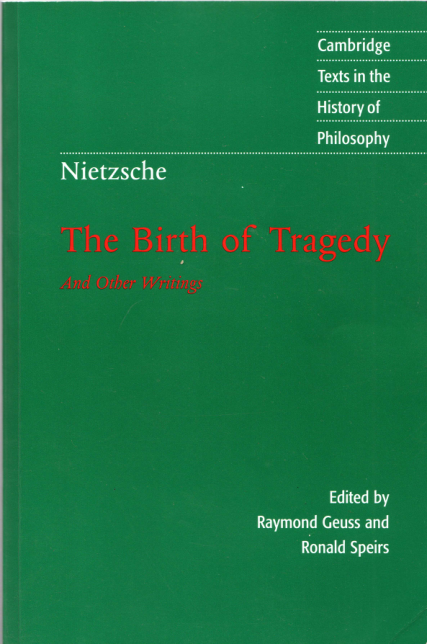Nietzsche: The Birth of Tragedy and Other Writings - Friedrich Nietzsche

## Metadata
- Author: **Friedrich Nietzsche**
- Full Title: Nietzsche: The Birth of Tragedy and Other Writings
- Category: #articles
- URL: https://readwise.io/reader/document_raw_content/208364102
## Highlights
- The world as we know it, Schopenhauer thought, the world ofobjects in space and time held together by relations ofcause and effect, was nothing but a representation, an illusion generated by the unending play of a meta- physical entity which he called 'the Will'. ([View Highlight](https://read.readwise.io/read/01j64j1y785935176mnmchfs51))
- This Will, the underlying reality ofthe world, expressed itself in a variety ofways in the human world, most keenly in the form ofsexual desire; it had each human indi- vidual in its grip and drove each ofus on to forms ofaction that inevitably ended either in disgusting satiation or in frustration. ([View Highlight](https://read.readwise.io/read/01j64j2zjnqzvedzb6yvnq11ev))
- As he would later put it, he had eventually overcome these two youthful enthusiasms, exchanging Schopenhauerian pessimism for a fully affirmative attitude towards life and coming to see Wagner as a decadent and the embodiment of everything that was to be rejected in modern culture. ([View Highlight](https://read.readwise.io/read/01j64j97pbywdskk4xvqx1xd1k))
- Wagner in his own way was just as much an egocentric megalomaniac as Nietzsche was. ([View Highlight](https://read.readwise.io/read/01j64jeeaeend8rrqwcns2d8pm))
- Correspondingly, throughout his life, even when he is writing in his most explicitly anti-Wagnerian mode, there is ample evidence ofNietzsche's continuing love ofWagner's music which clearly had a very powerful hold over him to the very end. Thomas Mann seems to me to get the matter right when he says that even Nietzsche's criticism ofWagner is 'inverted panegyric ... another form ofglorification' ('Panegyrikus mit umgekehrtem Vorzeichen ... eine andere Form der Verherrlichung'), an expression ofone ofthe major experiences ofNietzsche's life, his deep love-hate ofWagner and his music.2 The love was there virtually from the beginning, as was the hate; both lasted to the very end. ([View Highlight](https://read.readwise.io/read/01j64jjpdba2eg2m7z5h8b4c1j))
- We shall have gained much for the science ofaesthetics when we have come to realize, not just through logical insight but also with the certainty of something directly apprehended (Anschauung), that the continuous evolu- tion ofart is bound up with the duality ofthe Apolline and the Dionysiac in much the same way as reproduction depends on there being two sexes which co-exist in a state ofperpetual conflict interrupted only occasionally by periods of reconciliation. ([View Highlight](https://read.readwise.io/read/01j64k15bf20w1ydxa7ckdapb3))